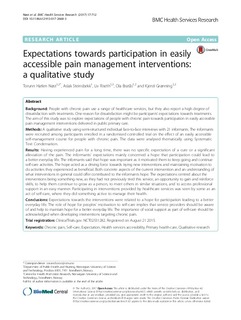| dc.contributor.author | Nøst, Torunn Hatlen | |
| dc.contributor.author | Steinsbekk, Aslak | |
| dc.contributor.author | Riseth, Liv | |
| dc.contributor.author | Bratås, Ola | |
| dc.contributor.author | Grønning, Kjersti | |
| dc.date.accessioned | 2017-12-12T10:27:50Z | |
| dc.date.available | 2017-12-12T10:27:50Z | |
| dc.date.created | 2017-12-09T16:15:27Z | |
| dc.date.issued | 2017 | |
| dc.identifier.citation | BMC Health Services Research. 2017, 17 . | nb_NO |
| dc.identifier.issn | 1472-6963 | |
| dc.identifier.uri | http://hdl.handle.net/11250/2470645 | |
| dc.description.abstract | Background
People with chronic pain use a range of healthcare services, but they also report a high degree of dissatisfaction with treatments. One reason for dissatisfaction might be participants’ expectations towards treatments. The aim of this study was to explore expectations of people with chronic pain towards participation in easily accessible pain management interventions delivered in public primary care.
Methods
A qualitative study using semi-structured individual face-to-face interviews with 21 informants. The informants were recruited among participants enrolled in a randomised controlled trial on the effect of an easily accessible self-management course for people with chronic pain. The data were analysed thematically using Systematic Text Condensation.
Results
Having experienced pain for a long time, there was no specific expectation of a cure or a significant alleviation of the pain. The informants’ expectations mainly concerned a hope that participation could lead to a better everyday life. The informants said that hope was important as it motivated them to keep going and continue self-care activities. The hope acted as a driving force towards trying new interventions and maintaining motivation to do activities they experienced as beneficial. Both concrete aspects of the current intervention and an understanding of what interventions in general could offer contributed to the informants hope. The expectations centred about the interventions being something new, as they had not previously tried this service, an opportunity to gain and reinforce skills, to help them continue to grow as a person, to meet others in similar situations, and to access professional support in an easy manner. Participating in interventions provided by healthcare services was seen by some as an act of self-care, where they did something active to manage their health.
Conclusions
Expectations towards the interventions were related to a hope for participation leading to a better everyday life. The role of hope for peoples’ motivation to self-care implies that service providers should be aware of and help to maintain hope for a better everyday life. The importance of social support as part of self-care should be acknowledged when developing interventions targeting chronic pain. | nb_NO |
| dc.language.iso | eng | nb_NO |
| dc.publisher | BioMed Central | nb_NO |
| dc.rights | Navngivelse 4.0 Internasjonal | * |
| dc.rights.uri | http://creativecommons.org/licenses/by/4.0/deed.no | * |
| dc.title | Expectations towards participation in easily accessible pain management interventions: a qualitative study | nb_NO |
| dc.type | Journal article | nb_NO |
| dc.type | Peer reviewed | nb_NO |
| dc.description.version | publishedVersion | nb_NO |
| dc.source.pagenumber | 10 | nb_NO |
| dc.source.volume | 17 | nb_NO |
| dc.source.journal | BMC Health Services Research | nb_NO |
| dc.identifier.doi | 10.1186/s12913-017-2668-3 | |
| dc.identifier.cristin | 1525180 | |
| dc.relation.project | Norges forskningsråd: 238331 | nb_NO |
| dc.description.localcode | © The Author(s). 2017. Open Access. This article is distributed under the terms of the Creative Commons Attribution 4.0 International License (http://creativecommons.org/licenses/by/4.0/), | nb_NO |
| cristin.unitcode | 194,65,20,0 | |
| cristin.unitname | Institutt for samfunnsmedisin og sykepleie | |
| cristin.ispublished | true | |
| cristin.fulltext | original | |
| cristin.qualitycode | 2 | |

